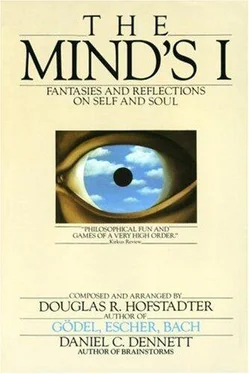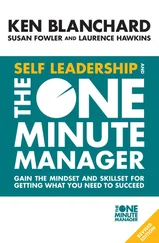In this selection, the little beasts flailing against death touches Lee Dirksen’s heart and our own. We see the small beetle fighting for its life, or in the words of Dylan Thomas, raging “against the dying of the light.” Refusing to “go gentle into that good night.” This supposed recognition of its own doom is perhaps the most convincing touch of all. It reminds us of the ill-fated animals in the ring, being randomly selected and slaughtered, trembling as they see the inexorable doom approach.
When does a body contain a soul? In this very emotional selection, we have seen “soul” emerge as a function not of any clearly defined inner state, but as a function of our own ability to project. This is, oddly enough, the most behaviouristic of approaches! We ask nothing about the internal mechanisms—instead we impute it all, given the behaviour. It is a strange sort of validation of the Turing test approach to “soul detection.”
D.R.H.
III
From Hardware to Software
9
Allen Wheelis
Spirit [12] Excerpt from On Not Knowing How to Live by Allen Wheelis. Copyright © 1975 by Allen Wheelis. Reprinted by permission of Harper & Row, Publishers, Inc.
We come into being as a slight thickening at the end of a long thread. Cells proliferate, become an excrescence, assume the shape of a man. The end of the thread now lies buried within, shielded, inviolate. Our task is to bear it forward, pass it on. We flourish for a moment, achieve a bit of singing and dancing, a few memories we would carve in stone, then we wither, twist out of shape. The end of the thread lies now in our children, extends back through us, unbroken, unfathomably into the past. Numberless thickenings have appeared on it, have flourished and have fallen away as we now fall away. Nothing remains but the germ-line. What changes to produce new structures as life evolves is not the momentary excrescence but the hereditary arrangements within the thread.
We are carriers of spirit. We know not how nor why nor where. On our shoulders, in our eyes, in anguished hands through unclear realm, into a future unknown, unknowable, and in continual creation, we bear its full weight. Depends it on us utterly, yet we know it not. We inch it forward with each beat of heart, give to it the work of hand, of mind. We falter, pass it on to our children, lay out our bones, fall away, are lost, forgotten. Spirit passes on, enlarged, enriched, more strange, complex.
We are being used. Should we not know in whose service? To whom, to what, give we unwitting loyalty? What is this quest? Beyond that which we have what could we want? What is a spirit?
A river or a rock, writes Jacques Monod, “we know, or believe, to have been molded by the free play of physical forces to which we cannot attribute any design, any ‘project’ or purpose. Not, that is, if we accept the basic premise of the scientific method, to wit, that nature is objective and not projective. ”
The basic premise carries a powerful appeal. For we remember a time, no more than a few generations ago, when the opposite seemed manifest, when the rock wanted to fall, the river to sing or fto rage. Willful spirits roamed the universe, used nature with whim. And we know what gains in understanding and control have come to us from the adoption of a point of view which holds that natural objects and events are without goal or intention. The rock doesn’t want anything, the volcano pursues no purpose, rivers quests not the sea, wind seeks no destination.
But thee is another view. The animism of the primitive is not the only alternative to scientific objectivity. This objectivity may be valid for the time spans in which we are accustomed to reckon, yet untrue for spans of enormously greater duration. The proposition that light travels in a straight line, unaffected by adjacent masses, serves us well in surveying our farm, yet makes for error in the mapping of distant galaxies. Likewise, the proposition that nature, what is just “out there,” is without purpose, severs us well as we deal with nature in days or years or lifetimes, yet may mislead us on the plains of eternity.
Spirit rises, matter falls. Spirit reaches like aflame, a leap of dancer. Out of the void it creates form like a god, is god. Spirit was from the start, though even that beginning may have been an ending of some earlier start. If we look back far enough we arrive at a primal mist wherein spirit is but a restlessness of atoms, a trembling of something there that will not stay in stillness and in cold.
Matter would have the universe a uniform dispersion, motionless, complete. Spirit would have an earth, a heaven and a hell, whirl and conflict, an incandescent sun to drive away the dark, to illuminate good and evil, would have thought, memory, desire, would build a stairway of forms increasing in complexity, inclusiveness, to a heaven ever receding above, changing always in configuration, becoming when reached but the way to more distant heavens, the last… but there is no last, for spirit tends upward without end, wanders, spirals, dips, but tends ever upward, ruthlessly using lower forms to create higher forms, moving toward ever greater inwardness, consciousness, spontaneity, to an ever greater freedom.
Particles become animate. Spirit leaps aside from matter, which tugs forever to pull it down, to make it still. Minute creatures writhe in warm oceans. Ever more complex become the tiny forms which bear for a moment a questing spirit. They come together, touch, spirit is beginning to create love. They touch, something passes. They die, die, die, endlessly. Who shall know the spawnings in the rivers of our past? Who shall count the waltzing grunion of that surf? Who will mourn the rabbits of the plains, the furry tides of lemmings? They die, die, die, but have touched, and something passes. Spirit leaps forever away, creates new bodies, endlessly, ever more complex vessels to bear spirit forward, pass it on enlarged to those who follow.
Virus becomes bacteria, becomes algae, becomes fern. Thrust of spirit cracks stone, drives up the Douglas fir. Amoeba reaches out soft blunt arms in ceaseless motion to find the world, to know it better, to bring it in, growing larger, questing further, ever more capacious of spirit. Anemone becomes squid, becomes fish, wriggling becomes swimming, becomes crawling: fish becomes slug, becomes lizard, crawling becomes walking, becomes running, becomes flying. Living things reach out to each other, spirit leaps between. Tropism becomes scent, becomes fascination, becomes lust, becomes love. Lizard to fox to monkey to man, in a look, in a word, we come together, touch, die, serve spirit without knowing, carry it forward, pass it on. Ever more winged this spirit, ever greater its leaps. We love someone far away, someone who died a long time ago.
* * *
“Man is the vessel of the Spirit,” writes Erich Heller; “…Spirit is the voyager who, passing through the land of man, bids the human soul to follow it to the Spirit’s purely spiritual destination.”
Viewed closely, the path of spirit is seen to meander, is a glisten of snail’s way in night forest, but from a height minor turnings merge into steadiness of course. Man has reached a ledge from which to look back. For thousands of years the view is clear, and beyond, through a haze, for thousands more, we still see quite a bit. The horizon is millions of years behind us. Beyond the vagrant turnings of our last march stretches a shining path across that vast expanse running straight. Man did not begin it nor will he end it, but makes it now, finds the passes, cuts the channels. Whose way is it we so further? Not man’s; for there’s our first footprint. Not life’s; for there’s still the path when life was not yet.
Читать дальше











